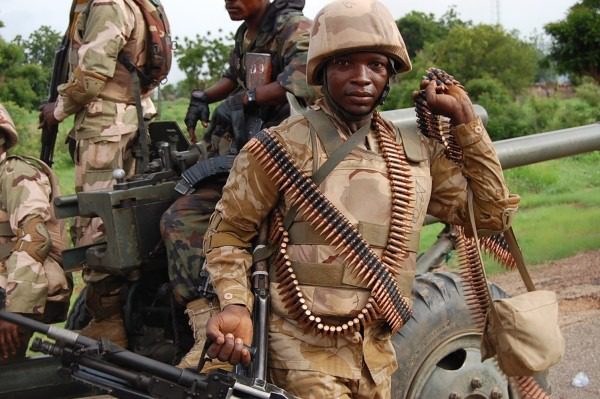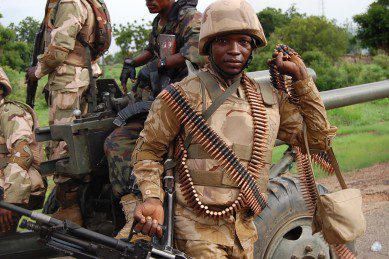National Issues
Why Boko Haram Cannot Be Overcome By Military Action Alone -By Ikechukwu Odigbo


To the horror of Nigerians, Boko Haram a few days ago released a video footage in which it reinforced its commitment to violence. As reported by Vanguard newspaper on April 1, this video in Hausa contains Boko Haram’s messages to the Nigerian military that ‘this war between us will not end’.
Viewed against official information from the Nigerian security agencies, especially the military, that Boko Haram is at the edge of total collapse, this development is a great cause for worry. Since 2009 Nigerian communities and institutions have been relentlessly assaulted by Boko Haram. Everyone has shared in this assault in one way or the other. Life is on the edge.
The Vanguard newspaper and The Economist estimate that between 3,600 to 20,000 people have been killed by the terror group, coupled with the alleged kidnap of 260 college girls at a school in Chibok. At least 2.6 million people have been displaced and properties worth millions of naira have been destroyed.
In May 2013, the government of Goodluck Jonathan declared a state of emergency in Adamawa, Yobe and Borno, the three states of North-Eastern Nigeria worst affected by Boko Haram. President Buhari’s rise to power, among other things, is because of his pledge to stop the rise of the group. Since winning the elections in 2015, the Nigerian president has also responded aggressively to the problem posed to national security by the Islamic fighters.
The army command headquarters was promptly moved to Maiduguri to respond swiftly to security threats. Both ground and air offensives have been reorganised. President Buhari’s has sought to mobilise both regional and international support just as the Boko Haram has also expanded its operations, dubbing itself the Islamic State West African Province (ISWAP).
In spite of Buhari’s efforts, the Islamic insurgency seems to be getting worse. In the first months of the new administration, sporadic bombings by Boko Haram occurred across Northern Nigeria. The Deputy Senate President Ike Ekweremmadu in his official 2015 Ramadan message to Nigerians and the world, reported by local and international media, called on the international community to help, while remarking that security conditions have deteriorated since Buhari’s rise to power.
A deeper reflection on the mission of Boko Haram and the method of its offensive suggests that it cannot simply be won by military action alone. Boko Haram is a fundamentalist Islamic ideology which enlightenment alone can cure. Boko Haram’s mission could be seen from the organisation’s name and is discernible from its mode of operations.
In Arabic its name is: Ahl-Sunnah Wa’l Jam’ah translated as ‘Group of the people of Sunnah for Preaching and Jihad’. From this one sees that it is committed not only to preaching and proselytising but also to jihad; that is, war with those who do not believe. Colloquially, Boko Haram simply means ‘western education is evil’, but that is because it defines itself in opposition to western education and the spread of liberal culture.
But tenacious loyalty to values, whether religious or secular in nature, is by no means new or unusual to man. The age-long persecution endured by Christian martyrs under the Roman Emperors fall under the same category, only that the early Christians were killed by the rulers, whereas the Boko Haram insurgents kill by themselves. The Spanish Inquisition, the official killing of unbelievers and apostates by monarchs in the name of Christian religion, at that time was in the name of religious values. The French Revolution and the American Revolutionary War against Britain were all armed conflicts fought out for the sake of values.
Today moral and religious fanaticism have not abated even among enlightened circles. In some countries like Uganda, homosexuals have been hounded and burnt to death. The Nigerian society is intolerant of homosexual culture. If people had their way, homosexuals could be wiped out. The case against homosexuality as well has a religious origin and is about which values are right and held supreme.
Whether secular or religious values tend to stand above human life and define it, for functionalist sociologists and moral philosophers, values or moral norms are the basis of society’s and man’s capacity for self-identification and definition. Human life, more or less, is a continuous response to one value or the other.
In the case of Boko Haram, the Nigerian military cannot force Islamic fundamentalists to change their mind, although it can crush them physically today. In the meantime even this task, as we can see, is proving quite difficult. President Buhari’s spirited response would have done it, if it was possible. In other words, it seems right to think that unless the insurgents change from within, another more viable and violent stub will rise from the ashes of their remains.
The most difficult task facing leaders of Northern Nigeria, and indeed the federal government of Nigeria is, strictly speaking, to choose between modern progressive values and the other alternative of religious and backward ideals. In other words, they must choose between modern education modelled against western values or to insist on Islamic and Arabic education. Whichever they choose can only truly be seen from their actions and priority list.
The advantage of broad-minded education such as we obtain from public schools is a belief in pluralism and tolerance. Nigerian society and the world at large know that it is the only way to peace. This is why freedom of religion must remain a strong component of our constitution. It does not seek to make us religious, but it seeks to save us from religious slavery.
On the other hand non-inclusive and narrowly designed education breeds bigotry and fundamentalism, which can escalate to armed resistance, depending on a number of other factors. Although religious education might be good for social cohesion and inculcation of virtues, only those aspects that accommodate divergent views can truly help in character and nation-building.
Ikechukwu Odigbo is a doctoral researcher in Philosophy at the University of Essex.




















